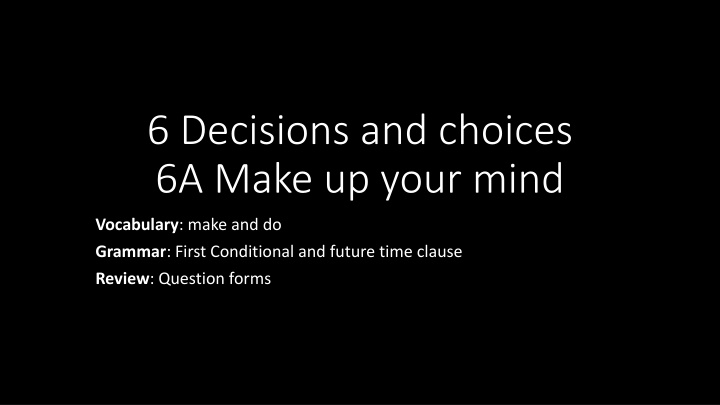
English Grammar Review and Practice: Decisions and Choices
Enhance your English grammar skills with a focus on first conditional sentences and future time clauses. Learn vocabulary related to decision-making, and practice exercises to solidify your understanding. Visit the provided link for additional resources on first conditional exercises.
Download Presentation

Please find below an Image/Link to download the presentation.
The content on the website is provided AS IS for your information and personal use only. It may not be sold, licensed, or shared on other websites without obtaining consent from the author. If you encounter any issues during the download, it is possible that the publisher has removed the file from their server.
You are allowed to download the files provided on this website for personal or commercial use, subject to the condition that they are used lawfully. All files are the property of their respective owners.
The content on the website is provided AS IS for your information and personal use only. It may not be sold, licensed, or shared on other websites without obtaining consent from the author.
E N D
Presentation Transcript
6 Decisions and choices 6A Make up your mind Vocabulary: make and do Grammar: First Conditional and future time clause Review: Question forms
6A Make up your mind Vocabulary: make and do Make: a decision; a mistake; money; friends; a noise; dinner; an excuse; someone laugh/cry; up your mind; progress; a cake; a mess of something; an appointment Do: the cleanig; a course; homework; nothing; exercise; the washing- up; the shopping; some work; the washing; a degree; an exam; the housework; someone a favour
First Conditional We use the First Conditional to talk about the result of a possible event or a situation in the future 1) If I m late again, I ll lose my job. 2) We will miss the plane if we don t get there by five. The if clause talks about things that are possible, but not certain The main clause that we think the result will be in this situation If clause main clause (if + Present Simple) (will/won t + infinitive) When we start the sentence with the if clause we use a comma (,) after this clause (e.g. 1). When we startstart with the main clause we don t use a comma (e.g. 2). We can use might in the main clause to mean will perhaps: We can use unless to mean if not in the first conditional Unless I do it now, I ll be too old. = If I don t do it now, I ll be too old.
Future time clauses with when, as soon as, before, after, until We can use sentences with when, as soon as, before, after, and until to talk about the future: I ll pack before I go to bed. After these words we use the Present Simple: I ll call Bill when I get home. In the main clause we use will/won t + infinitive: As soon as I finish this report, I ll go to the bank. We use when to say we are certain something will happen. We use if to say something is possible, but it isn t certain. We use as soon as to say something will happen immediately after something else. We use until to say something stops happening at this time.
Now, lets practice First conditional and Time clauses. Could you please, do exercise 8/9/10, p. 45, Student s book, and exercise 3/4/5/6/7, p30/31, Workbook. For more information on First conditional please visit https://www.e-grammar.org/conditional-1-exercises-pdf/
Thank you for your attention! # hope to see you soon Lecturer Ivana Mila i ivana.milacic@udg.edu.me
